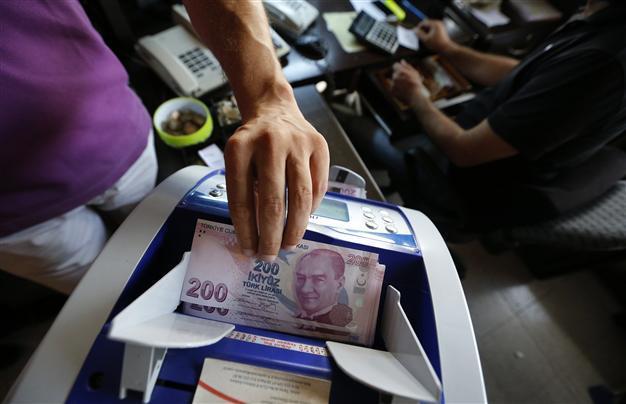Turkey’s markets, lira rally as Fed delays taper
ISTANBUL

A money changer uses a machine to count Turkish liras in the border city of Hatay September 17, 2013. REUTERS photo
The Turkish Lira and the national stock exchange (Borsa Istanbul) 100 Index surged Sept.19 as the U.S. Federal Reserve’s surprise decision to sustain its monetary stimulus granted a lifeline to embattled emerging markets.The lira rose to 1.95 to the dollar from 1.9975 late on Sept. 18. It touched a record low of 2.070 at the beginning of the month on Fed tapering expectations. Borsa Istanbul National 100 index surged almost 7.1 percent, the biggest surge among the emerging markets.
The Fed said late Sept. 18 that it would continue buying bonds at an $85 billion monthly pace for now, surprising financial markets that were braced for a reduction in the central bank’s economic stimulus.
Citing strains in the economy from tight fiscal policy and higher mortgage rates, the Fed decided against the tapering of asset purchases that investors had all but priced into stock and bond markets.
In a new set of quarterly forecasts, the Fed now sees growth in a 2 percent to 2.3 percent range this year, down from 2.3 percent to 2.6 percent in its June estimates. The downgrade for next year was even sharper: 2.9-3.1 percent from 3.0-3.5 percent.
“The Fed’s latest decision will postpone the negative effects of its plan to end the high liquidity party in the markets on Turkish markets,” JCR Eurasia Rating head, Orhan Ökmen, told Reuters by a written statement.
Sooner or later Fed to taper
The Fed’s decision appears to cause some revival in global risk appetite again, pouring money to the emerging markets, including Turkey, sector experts said, but they added that all of these markets needed to prepare for the Fed’s inevitable (but gradual) transition to the Fed’s tapering.
The emerging economies, including India and Turkey, among others, have relied until now on foreign investment to pay for their deficits as well as to finance interest payments on foreign borrowing, making them especially vulnerable to capital outflows that have reached tens of billions of dollars over the summer.
A gaping current account deficit, mostly driven by huge energy imports, and high foreign debt have made Turkey one of the countries most exposed to a shift in global capital likely to follow a cut in bond purchases by the Fed.
“The Fed’s tapering decision will provide temporary relief, but its current policy will not continue forever,” Finance Minister Mehmet Şimşek told Reuters in an interview Sept.19.
The good news for Turkey was the Turkish economy growing at a 4.4 percent annual rate. The Turkish Statistical Institute (TÜİK) said that this was driven by imports and consumer consumption. The growth figures however were blurred by the release of data on Turkey’s current account deficit for July. This was higher than expected at $5.8bn, contributing to a total of $36bn for the first half of the year. Foreign direct investment for the same period was a modest $5bn.
















